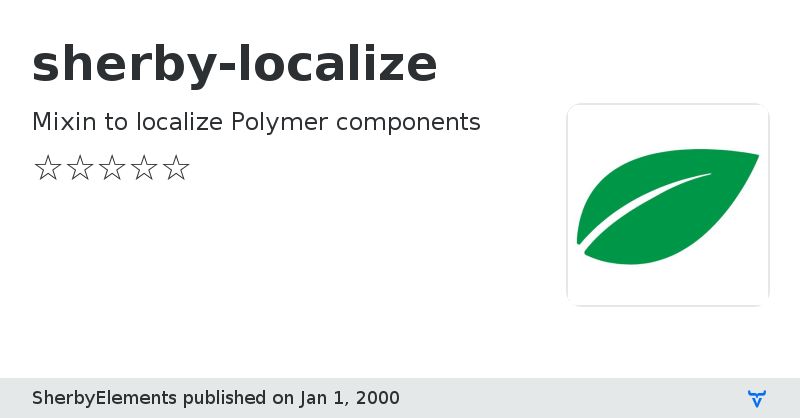sherby-localize - Vaadin Add-on Directory
Mixin to localize Polymer components
[](https://www.webcomponents.org/element/SherbyElements/sherby-localize)
[](https://travis-ci.org/SherbyElements/sherby-localize)
# Sherby.LocalizeMixin
If you want to **translate**, to **localize** your application or simply only
**regroup** all static texts, the `Sherby.LocalizeMixin` can help you.
The mixin internally use a [fork][2] of [AppLocalizeBehavior][3] to wraps the
[Format.js][4] library with [Chrome.i18n][5] translation files. The
*Chrome.i18n* format allow to add an optional `description` associated with
the translation (`message`), to give an additional context to translators.
By exemple, a *locales/en-CA.json* file:
```json
{
"meat-toppings": {
"description": "A pizza is nothing without meat.",
"message": "Meat Toppings",
}
}
```
If you want to have **nested** localization files, as below, you simply need
to provide all keys of the nested object, separate by **.** (delimiter by
default). By exemple, the key `meat-toppings.bacon-pieces` will provide the
correct translation (Bacon Pieces) for the following json file:
```json
{
"meat-toppings": {
"bacon-pieces": {
"description": "Bacon is life!",
"message": "Bacon Pieces"
}
}
}
```
Also, as this mixin use the *[UdeS.LanguageMixin][1]*, the localized file
associated with the current language is dynamically loaded and the localised
texts are automatically translated when the current language change.
## Usage
- Add the `@sherby/sherby-localize` dependency to your projet:
```bash
npm install @sherby/sherby-localize
```
- Create the locales directory near the component you want localized
and add the localize files:
*locales/en-CA.json*
```json
{
"bacon-pieces": {
"description": "Bacon is life!",
"message": "Bacon Pieces"
}
}
```
*locales/fr.json*
```json
{
"bacon-pieces": {
"description": "Bacon is life!",
"message": "Morceaux de bacon"
}
}
```
- Use it
```javascript
// Import the `SherbyLocalizeMixin` inside the component you want localized
import { SherbyLocalizeMixin } from '@sherby/sherby-localize/sherby-localize-mixin.js';
import { html, PolymerElement } from '@polymer/polymer/polymer-element.js';
/* eslint-disable no-unused-vars */
// Apply the mixin to your element class
/**
* @customElement
* @polymer
* @extends {PolymerElement}
* @appliesMixin SherbyLocalizeMixin
*/
class MyElement extends SherbyLocalizeMixin(PolymerElement) {
static get template() {
// Use the `localize` function to translate all texts
return html`
View on NPM[[localize('meat-toppings')]]
`; } /** * Get the localized bacon pieces string. * @param {Function} localize Localize function. * @return {String} Localized bacon pieces. */ getLocalizedBaconPieces(localize) { return localize('meat-toppings.bacon-pieces') || ''; } } ``` ## Demo ```htmlView on GitHub
sherby-localize version 2.0.0-rc.1
### Dependencies
* @polymer/app-localize-behavior#^3.0.0-pre.1
* @polymer/polymer#^3.0.0-pre.1
* @sherby/sherby-nested-property#^2.0.0-rc.1
* @udeselements/udes-language-mixin#^3.0.0-rc.1